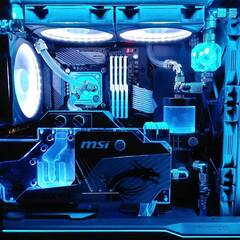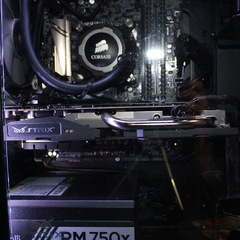-
Posts
1,182 -
Joined
-
Last visited
Awards
This user doesn't have any awards
About BigDamn
- Birthday Sep 02, 1998
Contact Methods
-
Discord
Big Damn#6757
-
Steam
WallyBeaner
-
Origin
WallyBeener
Profile Information
-
Gender
Male
-
Location
United States
-
Interests
Programming, audio, RC vehicles, and electronics in general
System
-
CPU
Ryzen 7 3700x (OC @4.4ghz)
-
Motherboard
MSI X470 Gaming Pro Carbon
-
RAM
Crucial Ballistix LT 2x16gb 3200mhz (OC 3600mhz CL: 16)
-
GPU
MSI Armor GTX 1080 8GB (Water Cooled)
-
Case
NZXT H440
-
Storage
Samsung 960 Evo 256gb NVME, 850 Evo 500gb, 860 Evo 1tb + NAS
-
PSU
Corsair HX850 Semi-Modular
-
Display(s)
Vizio 43" D43-D2 (main), 2x Asus 23" VS238H-P
-
Cooling
Custom loop. 2x360mm Radiators
-
Keyboard
Corsair Strafe RGB MK.2 CherryMX Red
-
Mouse
Corsair M65 RGB Pro
-
Sound
Creative Labs Soundblaster ZXR
-
Operating System
Windows 10
-
Laptop
MSI GP62MVR Leopard Pro-248
Recent Profile Visitors
2,812 profile views
BigDamn's Achievements
-
I'm assuming the 7800x would be two six core CCDs with a single core disabled each, due to being faulty. The single threaded performance is uninspiring, but these are just engineering samples. That said, the 7300x is definitely the most intriguing. With Ryzen 7000 running notoriously hot (by design), I wonder if they'll take a different approach here. I think this is a good opportunity for AMD to reclaim the efficiency crown, with lower power targets and therefore lower heat output. This would make AMD a compelling choice for small form-factor PCs, provided the performance is still there. This may also shed light on AMDs approach with it's Zen 4 laptop CPUs, which have yet to be announced. Overall I like this move by AMD for competitive reasons. Gap filler CPUs paired with price cuts and (supposedly) cheaper motherboards, with the addition of AMDs excellent track record of maintaining its consumer platforms makes them a very good long-term option. Everyone knows Intels DDR4 facade will come to an end soon, and may even be met with a new socket or lack of motherboard backwards compatibility (which Intel is notorious for). AMD may have a higher upfront cost, but it's a platform that will last.
-
Genericide. Why do people refer to a tissue as a Kleenex? (Common in most of the US, not sure about elsewhere). It's catchy, convenient, and common enough that it's become ingrained in peoples minds. Does Kleenex need to slap the word "tissue" on to the box to pay homage to the original idea of the tissue? Intelligent marketing teams will name their products in this way to ensure people immediately think of their product when applicable. "SuperSpeed USB 20gbps" does not adhere to this marketing strategy, even without the "++", which is part of the official logo. If it was so simple they wouldn't have these problems. People have had qualms with WiFi, HDMI, etc. at times, but no one has consistently remained under the gun from day one like USB has. I'm not going to blame manufacturers for using the easier name, but who we blame doesn't matter. We agree that enforcing the correct terminology is the proper way to handle this, and is an ACTUAL solution.
-
This is naive, quite frankly. Not only are you giving the consumers a massive, unfounded, benefit of the doubt, but you are also assuming that vendors such as HP care at all about customers disapproving of their tactics. AMD provides consumer friendly product names that make sense, USB doesn't. If HP promoted their products using CPUs with technical names such as "8-Core Zen4" or "6-Core AM5", it comes off as unprofessional and unhelpful. The proper "Ryzen" nomenclature provides even the most uninformed consumers with adequate information regarding where easy CPU falls in the performance stack. The higher end products will sell themselves. Again, basic marketing. This would likely be a contractual violation and/or trademark violation. AMD would NOT tolerate their own products being mismarketed and the negative PR with it. This is the correct response that any sensible company would have. It isn't just manufacturers using incorrect terminology, it's everyone. Whens the last time you heard someone refer to USB 3.2 as "SuperSpeed++ USB 20gbps"? Probably never. And no, it isn't some giant conspiracy to make the USB-IF look bad, it's because that name is a huge pain in the ass to say. USB 3.2 is easy. Why would manufacturers refer to a naming scheme that no one uses? The USB-IF needs to reign this in, even though you compared this to being a "dictator".
-
Why do you have such a difficult time understanding basic marketing? You use HP, AMD, etc. as examples, but don't ask why those companies don't have the issue that the USB-IF has? If you owned a product, would you not want companies to refer to it properly? If not, you'll be in the same mess that USB is in now. Why do you feel the need to belittle people for understanding this? Though you're right in understanding the concept of internal and external naming schemes (an easy concept, but credit where credit is due), there is quite clearly a flawed implementation here that other products do not have. So simply pointing fingers at ALL board manufactures (and others) is an unrealistic "solution". Direct your blame to the source, they can fix it.
-

My Most Chaotic Client EVER - Kallmekris Tech Makeover (SPONSORED)
BigDamn replied to SeanLMG's topic in LTT Releases
Her Instagram views are about to skyrocket -
Any laptop or small form factor desktop with Intel CPUs WILL have this problem. This isn't exclusive to HP. My Dell XPS has an 11th gen i7 that runs above base clock for all of two seconds before throttling (at full load). Why do you think Apple switched to their own silicon? Apple was in the exact same boat as HP, Dell, etc. until they had the balls to bet on themselves and produce their own chips. The real question is, why are OEMs so reluctant to utilize lower power AMD chips? Of all the CPUs available on the Z2 Mini, none of them are AMD. Same goes for XPS laptops from Dell (though the cheaper Inspirons' do have Ryzen offerings). OEMs would still need to engineer proper cooling solutions (which they seem to struggle with), but working with a ~120w 5950x is far more manageable than a 250w+ 12900KS.
-
It's entirely possible that you disabled the Windows "Hello" service, which is responsible for handling PIN login, among other things (I could be wrong about that). Provided you are not using Bitlocker encryption you may find success in looking up how to bypass the Windows login. Essentially you will have to access your Windows drive from a live Linux install (GParted) or another PC and replace the lock screen accessibility features with the command prompt binary. This will give you elevated CMD access from the lock screen, allowing you to create a new user account, which you can login to and re-enable service from. There may be other ways to do this, but this is how I've done it in similar situation. It may sound challenging, but if you can find a step-by-step guide you'll find it's not too difficult.
-
You can login, as in your password is rejected? Or is it not booting properly? Did you disable Microsoft services as part of the clean boot? You should only disable 3rd party services to avoid disabling essentials services. As for your important data, you can always load a live Linux based OS to a USB drive (such as GParted) and access your HDD that way. Backup to any other storage devices you have to at least get that taken care of. It's not worth putting your valuable data at risk just to get your PC boot.
-
It appears I made the right choice between the Pixel 4a and the (I think) OnePlus Nord. Both phones were similarly priced, and on paper the OnePlus was actually the better phone, but I went with the Pixel and have been quite happy with it. After owning Galaxy Note phones for years I thought it may be tough going to a lower end phone, but it really wasn't. And being that I'm never doing any strenuous tasks (nor did I use the S-Pen) I really couldn't justify spending $1000+ for a phone. The Pixel 4a performs quite well in daily tasks, gets me great battery life, and a near bug free experience. That said, it isn't without it's quirks: the headphone jack (one of my selling points) is a joke. It can't produce consistent volume and WILL stop playback and switch itself to full volume on its own. If you don't adjust the volume back down, BUCKLE UP, It's gonna be loud. And Google will not fix it, despite a length support thread I started with many users reporting the same thing (with multiple Pixels, not just the 4a). Also, the fingerprint scanner sucks. It's fast when it works, but when it doesn't work you're fucked. Wanna check your portfolio on TD Ameritrade? Hope your fingerprint scanner is working! If not, you aren't getting in (blessing in disguise with the current market). All in all, for $350 my Pixel 4a has been a hell of a deal. I'd still possibly consider OnePlus in the future, knowing that Pixel/Nexus has a rich of history of back breaking flaws/bugs, but it's certainly disappointing to see OnePlus in this state.
-
Depends on how the core test went. With VRAM passing I would hedge towards this not being a power delivery issue, and an issue with the GPU itself.
-
The CPUs are practically the same, and being that its a laptop you're unlikely to hit the 100mhz extra boost clock anyways, so the difference in CPU performance is negligible at most. For the GPU you got an entire step (or half step) up, which carries a noticeable gain in performance. You also get Windows 10 instead of Windows 11, which is worth it by itself. I'd say you got a pretty good deal here.
-
This sounds fairly typical of a failing GPU, as you may have guessed. You could try downloading the utility OCCT, which allows you to stress test your GPU core and VRAM separately and see if either or both of those cause this issue. If this is a power delivery issue in your VRM you may be able to underclock and undervolt to mitigate the issue until you're able to buy a new GPU. If it's an issue with the GPU core you may be SOL.
-
The gaming community should celebrate together, to commemorate an accomplishment not yet seen before. For the first time ever, we demonstrated that we WON'T spend our money on a shitty product, even with a major flagship game like Battlefield. The gaming community is great at bitching about rushed, broken, cash grab releases, yet they still throw their money at these games (Madden, anyone?). EA has finally hit the limit on what we will tolerate. I've been a Battlefield fan since BC2 and have seen some really rocky releases in that time. Even staples of the series, like BF4, underwent MAJOR criticism for being a disaster at release, though most of this is forgotten after the game has run its course. But after the mess that was BF5, people (myself included) were reluctant to even touch BF2042. After playing the beta I had complete confidence that I wouldn't even look at this game when it releases, and I'm glad I didn't. I won't touch the next one either. Lets hope MW2 appeals to us Battlefield fans.
-
The 12900k is impressive to an extent, but for content creation I still believe the 5950x is the clear winner. Though the chip is $100 more, the cost saved on AMD's platform and not requiring a top tier cooler even things out with a slight performance edge to Ryzen. I wish we could've seen a comparison between Windows 10 and Windows 11 for AMD to verify that the performance hit really is fixed. But man the 12600k is impressive. This is THE gaming chip to beat for the foreseeable future. Can't wait to see what AMD's response is when Zen4 releases.
-

Backblaze: SSDs might be as unreliable as disk drives
BigDamn replied to Lightwreather's topic in Tech News
You've been "unlucky" if that's your experience. So we're just going to pretend that Seagate hasn't rushed experimental drives to market on multiple occasions, sometimes topping a failure rate of 50%? Seagate makes such a good drive they put a generous 1 year warranty on them! Do you realize that brands like GoHardDrive sell REFURBISHED WD and HGST drives with a greater warranty than that? I've got about 50 drives in my possession, mostly WD, and have had issues only with Seagate. HGST/Hitachi, WD, and even my lone Toshiba have held up through the years, but Seagates have been dropping like flies. At work where we deal with significantly more drives it's much of the same story. And some of this was well within a "decade ago". If you want a decade ago look at Samsung drives, which you oddly compared to current HDD makers.











